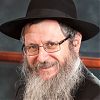There is a dispute that dates back to the time of the Geonim, if there is a Mitzvah and Chiyuv of Simcha on Rosh Hashana like the other Chagim or not.
In other words, do we have to generate Simcha by drinking wine, giving gifts, etc. like on Pesach, Shavuos, and Sukkos? Some maintain that since the Torah includes Rosh Hashana in the list of Yomim Tovim there is a Chiyuv of Simcha. However, others hold that the specific commandment of Simchas Yom Tov is only stated by the three festivals and not Rosh Hashana.
In the
Shulchan Aruch states that on Rosh Hashana when we make kiddush or daven we omit the phrase; Moadim lesimcha chaggim uzmanim le’sosson, that we say on other festivals. The Shulchan Aruch explains clearly that the reason is because Rosh Hashana does not have the Chiyuv and Mitzvah of simcha. However, this seems to contradict another ruling of the Shulchan Aruch which says that we should not fast on Rosh Hashanah. In fact, when we finish davening we go home, eat and drink and we are joyous. If there is no mitzvah of Simcha why can’t we fast and why should we eat nice foods?
One of the explanations of this (based on the writing of the Vilna Gaon) is that the eating and drinking on Rosh Hashana is not to fulfill the Mitzvah of Simcha but to achieve another concept. The purpose of the Yom Tovmeal is to display our trust and Bitachon in Hashem that he has answered our Tefilos, judged us favorably and He is going to bless us with a good year. Of course, we take the Yom Hadin seriously but we are also confident that Hashem has accepted our efforts.
Reb Shlomo Kluger in Chochmas Shlomo says that every good thing lives in our hearts.
needs action to solidify it. In other words, it is not enough to have something in your mind; you must do something to express it. Therefore, is it not sufficient to have Bitachon and believe in Hashem’s favorable judgment. We need to express it through a festive meal with fine foods.
Of course, this is in line with the famous passage said by Ezra on the second day of Rosh Hashana at the beginning of the second Beis Hamikdosh. When Ezra returned to Eretz Yisroel and found an assimilated community he reprimanded them on the Rosh Hashana. When they became inspired and began to cry, he told them not to be sad. “Go home,” he said. “Eat fat foods, drink sweet drinks, as the strength of Hashem is your happiness because this is a holy day for Hashem.”
I wish everyone a meaningful Rosh Hashana and the ability to have the trust and confidence that Hashem will definitely accept our efforts. May He bless us all with a Kesiva Vechasima Tova- a good, sweet, and successful year. May we be Zoche to the ultimate revelation of Hashems Malchus with the coming of Moshiach Tzidkeinu, Omein.
 Rabbi Michoel Gourarie
Rabbi Michoel Gourarie